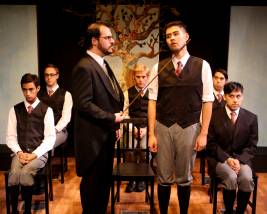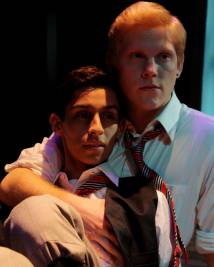RECOMMENDED
Theatre Out brings Broadway’s Spring Awakening to Orange County in a down-to-basics staging that retains much of the musical’s power and entertainment value despite the absence of several key elements that helped make the original New York production such a smash.
 For those in the OC who may not have heard of it, Spring Awakening is Steven Sater and Duncan Sheik’s musical adaptation of an 1891 drama by German playwright Frank Wedenkind, one which broke plenty of ground indeed with its depiction of on-and/or-offstage masturbation, child abuse, bondage, rape, abortion, and suicide among 14-year-olds just now awakening to their sexuality. No wonder Wedenkind’s late nineteenth-century shocker wasn’t staged on Broadway until 1916 and ended up closing after a single performance.
For those in the OC who may not have heard of it, Spring Awakening is Steven Sater and Duncan Sheik’s musical adaptation of an 1891 drama by German playwright Frank Wedenkind, one which broke plenty of ground indeed with its depiction of on-and/or-offstage masturbation, child abuse, bondage, rape, abortion, and suicide among 14-year-olds just now awakening to their sexuality. No wonder Wedenkind’s late nineteenth-century shocker wasn’t staged on Broadway until 1916 and ended up closing after a single performance.
Very much a groundbreaker in its own way, Sater and Sheik’s musical has proved considerably more successful than its source material, winning eight Tonys including Best Musical, Book, and Score.
Sater’s book follows Wedekind’s basic storylines. There are its two teen heroes, the handsome, popular, self-confident Melchior (Chris Hull) and his introverted, inhibited, wet-dream-plagued classmate Moritz (Jeffrey Fargo), and its heroine, the all-too-innocent but no less sexually inquisitive girl-next-door Wendla (Rachelle Rose Clark). There are also Melchior and Moritz’s ever-horny classmates and Wendla’s equally randy girlfriends. A pair of older actors (Anthony Galleran and Nicki Peek) stand in for all the adults in these teens’ lives.
 What made Spring Awakening work so brilliantly on Broadway was not just Sater’s streamlining of Wedekind’s melodramatic plot threads. Singer/songwriter/pop star Sheik’s catchy alternative rock score and Bill T. Jones’ brilliantly innovative choreography together turned Spring Awakening into a mainstream (and cult) international phenomenon.
What made Spring Awakening work so brilliantly on Broadway was not just Sater’s streamlining of Wedekind’s melodramatic plot threads. Singer/songwriter/pop star Sheik’s catchy alternative rock score and Bill T. Jones’ brilliantly innovative choreography together turned Spring Awakening into a mainstream (and cult) international phenomenon.
Spring Awakening begins quietly at Theatre Out just as it did in New York, with sexually burgeoning Wendla wondering if she’ll ever be told the truth about man-woman relations in “Mama Who Bore Me,” followed by a very funny sequence in which her highly embarrassed mother avoids the question entirely, an omission which proves ultimately disastrous. The song takes on a rock beat as Wendla’s girlfriends join her in a reprise, and it is here that audiences who’ve seen Spring Awakening either on Broadway or on tour will notice the first of several significant differences in this stripped-down, intimate staging.
In a previous review of Spring Awakening I wrote: For this reviewer, the magic in Spring Awakening begins when the mikes (or mics, if you prefer) come out.
At Theatre Out, there are no microphones, and while the OC’s LGBT theater has staged numerous “unplugged” musicals with absolutely sensational results (think last year’s The Wild Party), here a bit of stage magic is missing without those handheld mikes, particularly in the scene which follows.
 Melchior and Moritz are in Latin class, the former attempting to rescue the latter from the ire of their monster of a teacher, when the burning need to express what’s going on inside their minds and bodies suddenly erupts. As the first chords of “The Bitch Of Living,” Melchior traditionally draws from within his school uniform a previously-hidden mike, a gesture so defiant—and unexpected—that the first time I saw it I became a Spring Awakening fan for life. At Theatre Out, I couldn’t help wishing for the mikes that give these teens their power and their voice.
Melchior and Moritz are in Latin class, the former attempting to rescue the latter from the ire of their monster of a teacher, when the burning need to express what’s going on inside their minds and bodies suddenly erupts. As the first chords of “The Bitch Of Living,” Melchior traditionally draws from within his school uniform a previously-hidden mike, a gesture so defiant—and unexpected—that the first time I saw it I became a Spring Awakening fan for life. At Theatre Out, I couldn’t help wishing for the mikes that give these teens their power and their voice.
It’s also hard to imagine Broadway’s Spring Awakening without Tony-winner Jones’ cutting-edge choreography, with its innovative stomps and back kicks and leaps and jumps, which took every adolescent urge just bursting to break free and expressed it all in dance. The most striking illustration of this came in Act Two’s “Totally Fucked,” which had the entire Broadway cast contorting as if their sexual wants and their dissatisfaction with the world around them were ants crawling all over their bodies and driving them insane with pent-up desire, anger, and frustration.
At Theatre Out, there’s simply not enough room for these types of dance moves, at least as allowed by David C. Carnevale and Joey Baital’s scenic design, so choreographer Darcy Hogan and assistant choreographer Alissa Sanchez do the best they can in dance sequences that feature plenty of exciting, energetic upper body moves and in-place jumps which work as well as can be expected in the compact setting.
Recognizing the limitations of staging Spring Awakening Unplugged, director Carnevale makes the savvy decision to emphasize the musical’s quieter moments, which feature some of Sheik and lyricist Sater’s most memorable compositions. The Pink Floyd-esque “Touch Me,” in which the youthful cast of characters express their desire for intimate physical contact; the anthem-like “I Believe,” which sets the stage for Melchior and Wendla’s sexual flowering; and the exquisitely sad “Left Behind,” sung at a funeral for one of these teens are just three among many such songs.
Under Carnevale’s well thought-out direction, these teens may be even hornier than their predecessors, and that means considerably more physical self-exploration than before. More important in Carnevale’s Spring Awakening is that we see all this almost within touching distance (no pun intended), making these adolescent stories all the more touching (again no pun intended) when seen up close and personal.
Theatre Out’s cast deliver many fine performances, beginning with the exquisite Clark, the very definition of innocence mixed with pubescent desire as Wendla. Seeing the long-tressed, delicately featured Clark as Spring Awakening’s naive heroine, it seems hard to believe that it’s the same actress who made the outrageous Christmas Eve entirely her own creation in the recent Avenue Q. Clark makes Wendla her own as well, and it’s truly lovely work.
Hull’s Melchior may not quite be the town’s teen idol as before, but the soon-to-be UC Irvine grad plays and sings the part with sincerity and crystal clear tones. As Moritz, Fargo doesn’t have the power pipes that Best Featured Actor Tony winner John Gallagher, Jr. brought to the role, but he acts the hell out of Moritz’s raging caldron of teen angst and repressed desires.
 Supporting performances by Spring Awakening’s young cast are very good all around, from Jared Ryan Kaitz’s piano-obsessed Georg to Joey Nestra’s mother-fixated Otto to LeAnn DeLano’s lost-girl Ilsa to Stephanie Inglese’s abuse victim/survivor Martha. Jake Saenz and Frankie Rodriguez are standouts as sexy bisexual Hanschen and his innocent conquest Ernst, their extended boy-boy kissing in an amusing reprise of “The Word Of Your Body” giving Spring Awakening its LGBT appeal to Theatre Out regulars. Lexy Baeza (Anna) and Misa Moosekian (Thea) complete Wendla’s circle of female friends in fine fashion. As for the adults, the okay duo of Galleran and Peek could do more to distinguish between the many parts they play.
Supporting performances by Spring Awakening’s young cast are very good all around, from Jared Ryan Kaitz’s piano-obsessed Georg to Joey Nestra’s mother-fixated Otto to LeAnn DeLano’s lost-girl Ilsa to Stephanie Inglese’s abuse victim/survivor Martha. Jake Saenz and Frankie Rodriguez are standouts as sexy bisexual Hanschen and his innocent conquest Ernst, their extended boy-boy kissing in an amusing reprise of “The Word Of Your Body” giving Spring Awakening its LGBT appeal to Theatre Out regulars. Lexy Baeza (Anna) and Misa Moosekian (Thea) complete Wendla’s circle of female friends in fine fashion. As for the adults, the okay duo of Galleran and Peek could do more to distinguish between the many parts they play.
The talented young cast is never better than when joining voices to AnnMarie Milazzo’s vocal arrangements under Deb Barker-Garcia’s topnotch musical direction. Orchestral tracks are prerecorded, but sound almost live.
Carnevale and Baital’s set features a lovely, unique-to-this-production “Spring Awakening Tree,” its collage of images created by Clayton Froom, Mark Purine, and Gabriel Chabran. Baital’s costumes are terrific period pieces with a contemporary flair, with an inspired costume change for the show’s final number, “The Song Of Purple Summer,” that brings us up to the present day. Christina L. Munich’s lighting design suits the production’s intimacy to a T.
Alexis Stansfield is stage manager and David J. Nestor assistant stage manager.
Even on a much more intimate scale, Spring Awakening remains a powerful piece of theater, one in which contemporary music makes the struggles of nineteenth-century adolescents seem every bit as relevant to today’s teens as the ones they face on a daily basis, as if 21st Century souls were inhabiting these long-deceased youths. Melchior, Wendla, and Moritz may have been born in the 1870s, but their dilemmas (like the consequences of Wendla’s insufficient sexual education) still ring true in 2012.
Theatre Out, The Empire Theatre, 202 N. Broadway, Santa Ana.
www.theatreout.com
–Steven Stanley
April 6, 2012
Photos: Jason M. Hammond



 Since 2007, Steven Stanley's StageSceneLA.com has spotlighted the best in Southern California theater via reviews, interviews, and its annual StageSceneLA Scenies.
Since 2007, Steven Stanley's StageSceneLA.com has spotlighted the best in Southern California theater via reviews, interviews, and its annual StageSceneLA Scenies.







 COPYRIGHT 2024 STEVEN STANLEY :: DESIGN BY
COPYRIGHT 2024 STEVEN STANLEY :: DESIGN BY